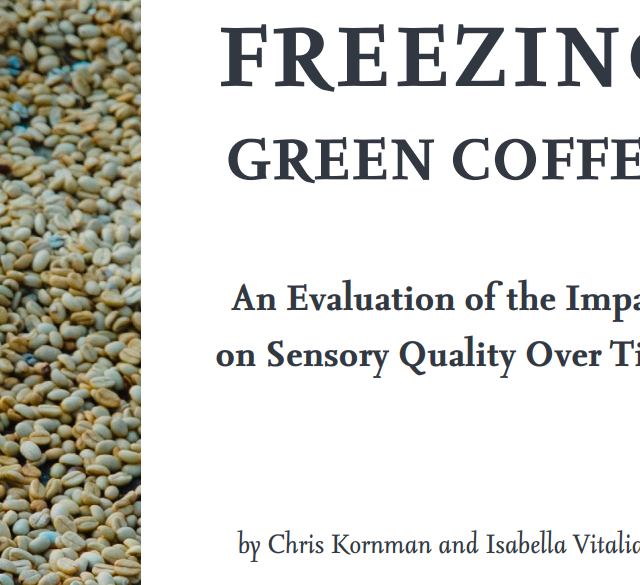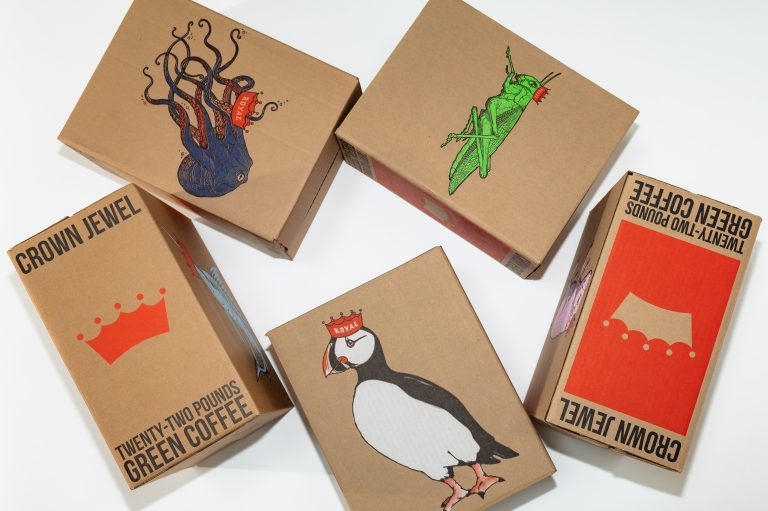A version of this article originally appeared in Roast Magazine
Inspired by the Roaster Village at World of Coffee in Europe, a new Roaster Village debuted at the Global Specialty Coffee Expo this year in Seattle. The village is designed to be a more relaxed and casual environment than the Expo show floor. Exhibitors included microroasters (producing fewer than 100,000 pounds per year) and boutique green coffee importers. For microroaster exhibitors, the goal was to introduce their coffee and branding to a large pool of coffee industry professionals and consumers. For attendees who purchased a ticket only to the U.S. Coffee Championships area, the Roaster Village was meant to be an added bonus because it offered the excitement of the Expo floor, but at a reduced price. To gauge the impact of this new space, I asked a variety of exhibitors and attendees about their experiences. Kevin Morales, my colleague here at Royal Coffee described the Roaster Village as “a more intimate and smaller setting, which made it easier to engage with attendees.” He interacted mainly with competitors and judges taking a break from the competition to explore the booths. Kate Blackman of Messenger Coffee Co. in Kansas City, Missouri, was judging the Brewers Cup Competition all weekend and was excited that a bit of the show floor was close by. “I thought it was a good complement to the competitions,” she noted, “and really fun to have so many roasters and importers in such close proximity to each other, instead of spread out throughout the show floor.”
 The village provided an opportunity for small roasters to showcase their coffee and their brands. | Photo courtesy of the Specialty Coffee Association
The village provided an opportunity for small roasters to showcase their coffee and their brands. | Photo courtesy of the Specialty Coffee Association
Exhibitors had access to hot water towers, grinders and manual brewing devices, and attendees eagerly lined up for coffee. The space, which showcased 25 exhibitors, provided a quick snapshot of the specialty market. Attendee Jon Ferguson, a green buyer at Arbor Day Foundation in Lincoln, Nebraska, was struck by how many small roasters were featured in one place, noting, “I could experience which flavor profiles are trending in the specialty industry and how roasters are developing these qualities through their roasting techniques.” For coffee buyers, the space provided “the opportunity to taste and see what qualities and relationships importers are offering,” Ferguson added. For multi-roaster cafe owners, the village provided a place to develop new partnerships as they could meet roasters, learn their stories, and taste their best coffees all in one interaction.For people new to the coffee business, the Roaster Village offered the opportunity to learn about the industry and network in a casual, welcoming environment.
 Royal Coffee’s Director of Operations, Jennifer Huber & President, Bob Fulmer passing time in the Roaster Village.
Royal Coffee’s Director of Operations, Jennifer Huber & President, Bob Fulmer passing time in the Roaster Village.
Exhibitor Deaton Pigot, owner of Take Flight Coffee in Los Angeles, designed a game at his booth with daily prizes, including a coffee brewer, a grinder and an Ikawa sample roaster. To enter, participants had to guess the origin/region of several brewed coffees and submit their guesses on Instagram with a photo and the hashtag #MidnightFlightSCA17. For coffee marketers, the Roaster Village was a great place to introduce branding and merchandise and receive immediate feedback. Deaton quickly sold out of his line of women’s apparel, including tank tops and t-shirts, noting that items with low-key branding were most popular.
Alex LittleJohn, who has served on the Barista Guild of America (BGA) Executive Council and is an instructor for the Specialty Coffee Association, thought the Roaster Village brought more engagement to the coffee competitions taking place in the hall. “The village complemented the competition area by adding more people and the opportunity to mingle at the booths,”she noted. “It was nice to take a break from competitions and circulate between the BGA coffee bar and the Roaster Village, and to see a variety of people and companies.” Exhibitor Omar Herrera of Minnesota’s La Bodega (a Cafe Imports company) said he spoke with a lot of people who were new to the coffee industry, and the village was a great hub for them to learn more about it. “The craft of roasting has never been more accessible to folks looking to start new coffee brands,” he said. “The Roaster Village definitely shares a similar mission as La Bodega in assisting new and smaller roasters in growing their business.” The ultimate goal for village organizers is that Expo attendees—particularly roasters, importers, competitors and those new to the coffee industry—will recognize the Roaster Village as a must-see attraction during the annual event.
 Switchbox Roasters Owner Brian Protsman at the Royal Coffee stand in the Roaster Village.
Switchbox Roasters Owner Brian Protsman at the Royal Coffee stand in the Roaster Village.
Switchbox Roasters was one of two winners of our Crown Jewel Instagram photo contest. Not pictured is the other winner of the contest, Abanico Coffee Roasters


